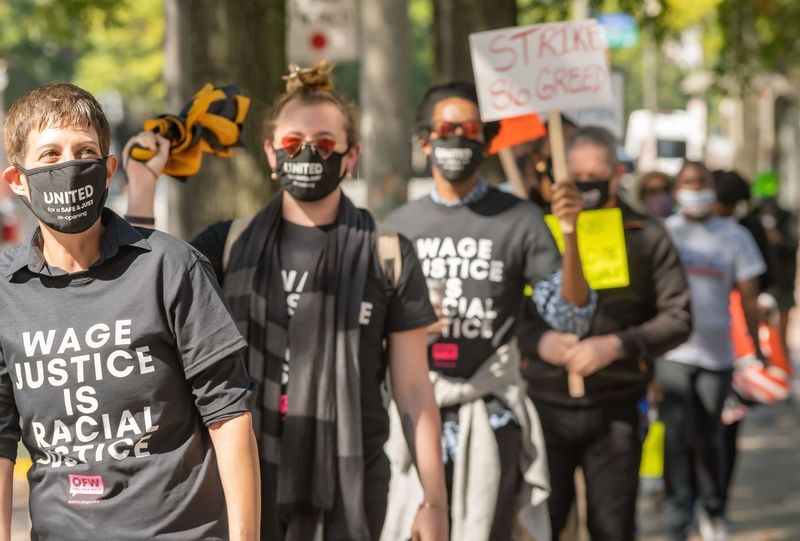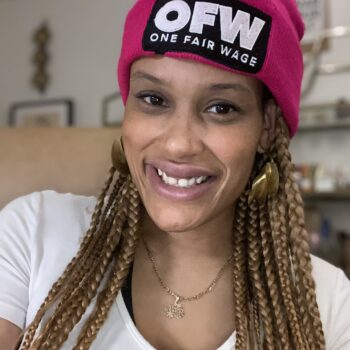Nikki Cole has spent more than a decade building worker and progressive political power at the local and national level, most recently as the National Policy Campaign Director for One Fair Wage. Launched in 2019, OFW grew out of the work of the Restaurant Opportunities Center, and is focused on ending the sub-minimum wage for tipped workers, currently frozen at $2.13. Cole began working in the hospitality industry at 15 and started organizing with ROC in 2009. She sat down with Mat Hanson from The Forge to talk about how tipped workers have been affected by the pandemic, how they have continued to organize during one of the most difficult times for their industry, where they fit into the fight for $15, and the forces they are up against in their effort to win one fair wage. This interview has been edited and condensed.
What is the Restaurant Opportunities Center’s (ROC) theory of change and organizing model?
ROC’s mission is to advance and protect wages and workplace benefits for restaurant workers. The organization works in three prongs. The first prong is workplace justice, and that entails direct worker organizing. Under that prong, ROC had what I like to call “scrimmages” with organizing at smaller restaurants or mini empires. After a while, we realized how the restaurant industry runs, in terms of policies. There are several key corporate empire restaurants that really shape the conditions for how restaurants operate in the United States. And one of those corporations is the Darden Corporation. They had Red Lobster, Olive Garden, The Capital Grille, Bahama Breeze, Seasons 52, and a couple of other places. So our theory of change, under the workplace justice prong, was, “Well if we can change the policies and the practices at Darden Restaurants, then that will have a positive impact across the industry.”
Our second prong was a service component, the Colors Hospitality Opportunities for Workers (CHOW) classes, which offer workers server classes, bartending classes, and English as a second language class. [These classes] build the base, and it’s a leadership development pipeline as well, where we can identify what other talents workers have and encourage them to join one of the other committees. The third prong is policy shift. And that’s where the advocacy work comes in. The workers that ROC organizes are able to join fights for fair wages, paid sick days, or the right to return to work.
Tell us about the fight for One Fair Wage and how it relates to the Fight for $15. What is the importance of building workplace power among tipped workers, and why is it so important to have workers leading the fight and not just professional advocates?
When you leave the advocacy to the professional advocates, who either have never worked in a restaurant or haven’t worked in the industry for a long time, they create policy that leaves us out or that doesn’t meet the needs of this huge population of people. And that’s why it’s really important to build the base.
It’s also important to build the base because, in the Fight for $15, One Fair Wage has been repeatedly left out. They’ve been there at the beginning, in various fights across the states, but the sausage of policy making happens, and again and again the tipped workers are left out. The One Fair Wage campaign started in 2013, and ROC United, as a national organization, was only about four years old at the time. ROC has had challenges with building the sustained, large base that unions do, for a number of reasons. The first reason is the deplorable conditions of the industry, causing extreme rates of high turnover at a workplace. So, as an organizer, you might develop a relationship with someone, turn them out to a few things and then they’re like, “I’m actually done with the restaurant industry. I’m moving on to different things.” So that’s a challenge with building long term.
ROC is really awesome at hiring directly impacted people to lead the work, restaurant workers organizing other restaurant workers, but a lot of those people are women and people of color that don’t have formal organizing training and need to go through that. And some people find “this is for me, or it’s not for me.” There’s burnout of workers, of organizers. Infrastructure building [is a challenge too, as it is for] a whole lot of grassroots organizations, and part of that challenge is rooted in the funding structure for the non-profit industrial complex.
The fight for One Fair Wage, in a lot of ways, is a fight to continue to dismantle the economic legacy and persistence of Jim Crow policies, and there are really powerful institutions that exist to preserve these legacies. What can you tell us about who you are up against in the fight?
When emancipation happened, you have this great migration of Black people all across the United States. In the restaurant industry, what ended up happening was the organized owners saw that tipping was a custom in Europe and thought, “We’ll hire newly freed slaves, but we’re not going to pay them. They will earn their income only from tips.” Which was different from Europe, where people were paid a wage plus the tips on top.
Early 1900s, you have this surge of organizing and unionization. Of the tipped service workers, the only ones that were successful in organizing to guarantee a wage and a union were the Pullman car porters with A. Philip Randolph. The rest of the industry still was stuck on no wages, you live off of tips. So then fast forward to the New Deal. The first minimum wage is established, but by that point the restaurant industry has enough influence and clout to establish a sub-minimum wage for tipped workers. At the time, they set it at fifty percent of what the overall minimum wage was [and it hovered around there until the 1990s]. In 1996, the National Restaurant Association struck a deal with Congress saying, “We won’t advocate against the rise of the overall minimum wage anymore if you agree to freeze the tipped minimum wage at $2.13 forever.” Of course, no workers were at the table. So 1996 until now, the federal tipped minimum wage has been $2.13 and hasn’t risen at all.
The Restaurant Association has been getting more powerful, paying their people even less. At this moment in time, with the American Rescue Plan and the Raise the Wage Act on the table, the Restaurant Association is still so powerful that they’re able to get millions of dollars of relief and it has not necessarily trickled down to the workers that they employ, who don’t get unemployment insurance most of the time, or other security benefits to help them get through this time.
What does the fight for One Fair Wage look like today? How has the fight been impacted by the pandemic?
In the fall of 2019, the One Fair Wage campaign became its own independent organization. Still sisters with ROC, where ROC will continue to focus on workplace justice campaigns, training people and policy campaigns, but One Fair Wage will be an organization that solely focuses on the tipped minimum wage, because it needs that much attention and effort. ROC helped build this public narrative and base around the issue so now One Fair Wage is not just fighting for tipped restaurant workers; it is fighting for the Uber and Lyft drivers, the car wash workers, the nail salon techs, and also youth and incarcerated, and workers with disabilities. All those classes of workers are either tipped or guaranteed a sub-minimum wage. So, the organization formed to focus on that.
And then, of course, COVID hit, which changed the trajectory of the organization and it’s strategy to build power. One Fair Wage, from its experience working with ROC, knew that even a week or two shutdown was going to put workers at great risk for starvation, home loss, etcetera because tipped workers, as we call it, live tip-to-mouth. We launched an emergency fund. We didn’t know how long the pandemic would be going on; we took $10,000 from our own budget, and we put a Google Form and an application up online. No advertising for it at all. And within the first day, 4,000 restaurant workers applied. And it grew exponentially every day, so we had to very quickly formalize and expand the operations to serve tipped workers. We raised a lot more money, from foundations and individual donors: $30 million is what we raised. We recruited 1,000 volunteers, we increased our staff, and we started calling through every single person who applied for the emergency fund. 230,000 restaurant workers applied for the emergency fund, and they’re still applying for it today.
Since then, One Fair Wage has organized, probably, thirty public actions. The situation for restaurant workers is so dire that it was easy to get restaurant workers to come out and strike, to [put on] creative actions to get the attention of lawmakers and the media. To help get media attention, to get the attention of legislators, One Fair Wage launched an Elena the Essential campaign. Essentially they re-iconized Rosie the Riveter and made her into a brown woman, in the same pose, saying “service workers are all essential, and we deserve to be paid fairly.” There’s posters, there’s stickers, but there are 18 foot and 24 foot art builds of statues of Elena the Essential that the workers have been taking on tour across the country.

Because of the impact of the pandemic on restaurants, it seems like the fight for One Fair Wage has gotten more attention lately. How has this played out, and how have those in power, or seeking power, responded?
One Fair Wage got 3,000 media hits last year, which is phenomenal for a non-profit organization. Phenomenal. We have these town halls with Kamala Harris, with AOC, with the governor of Michigan, Gretchen Whitmer, with senators from Pennsylvania. Simultaneously, we were sending out constant communications to the base of workers we serve for places that they could get additional resources and help, and ongoing opportunities to get involved in our organization, to make change. We were also mobilizing them to vote. So all of those things, in addition to ongoing advocacy, led to One Fair Wage being a policy priority in the presidential campaign.
Can you talk about where the Democrats are coming up short and where they might be delivering?
We need across-the-board campaign finance reform because, even when working-class people put their blood, sweat, and tears to turn out and win elections in a public health pandemic, Democrats have campaign sponsors who give them a whole lot more money than we do, and those campaign sponsors are folks like the National Restaurant Association.
No matter how many times we take workers to the Capitol, no matter reports, research we put out, it seems like we get the smile — “yeah, yeah we understand; we’re with you” — and then the same thing happens. We get cut out of the bill. That’s why One Fair Wage is at this table, trying to make sure that tipped restaurant workers don’t get left out of [the federal minimum wage increase]. The advocates there right now are so afraid of losing the $15 minimum wage that they do not want to include One Fair Wage at the fear of losing it all.
On that note, how do we build solidarity among everyone who is fighting for One Fair Wage and the broader Fight for $15, both at the state level and the national level?
It’s not an easy thing to do. Building solidarity between organizations, between different people, is the labor of developing relationships. It’s the labor of having ongoing one-to-ones with people and learning about your similar values, similar self-interests. And learning how to work together and negotiate together, emotionally and intellectually. And, unfortunately, a lot of leaders in the movement don’t have the time or the interest to do that. They have their eyes on their particular piece of the ball. Their eyes on their particular issue and they don’t put enough effort into developing relationships with people from other sectors. I think if people actually slow down to strategize together, to really assess and do some power analysis, we can win it.
Progressives have been successfully building power and it has really started to shift what’s possible. One reason for this is who is at the table and who is in the halls of power. AOC might be the best of a tipped worker elected to public office. Could you talk a little bit about what a difference it makes to have someone who has the experience of being a worker, and specifically a tipped worker, have a seat at the table, whether in Congress or on a campaign organizing committee or in a coalition?
It’s so important. It helps shift the narrative about who workers are. Because of the legacy of Jim Crow — and this is not just in the service industry, we’re talking about domestic workers and farm workers too — there’s this perception that these people are less than. There’s this narrative that those people are lazy, that they can’t get a better job. There’s a narrative that those types of jobs are just for teenagers. And there’s also a narrative of white supremacy and sexism that says, if you can’t make it in the restaurant industry, it means that you are crappy at what you do.
People like AOC, Cori Bush, Councilmember Janeese Lewis George in Washington D.C. have the responsibility of educating their fellow elected officials about this industry, service life, sub-minimum wage life, and get them on board with us. It’s their job to organize those people as much as it is our job.


